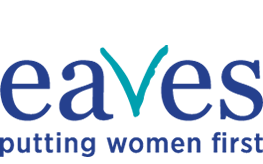Capital Exploits
New study finds prostitution in every London borough and that trafficked women are being exploited on-street
Capital Exploits: A Study of Prostitution and Trafficking in London published today examines changing trends and patterns in prostitution and trafficking for the purposes of prostitution across London. The study, published by Eaves for Women was commissioned by the Mayor’s Office for Policing and Crime (MOPAC) in the context of their Violence Against Women and Girls strategy, and is based on six months of intensive research in the capital. Some of its key findings include the following:
- There is an inconsistent police and local authority approach to addressing prostitution across London which has a negative and harmful impact on the women involved.
- Services often fail to identify that a woman accessing support may be involved in prostitution and therefore do not refer her to specialist support.
- Local residents are increasingly calling on police and local authorities to switch tactics and to target pimps, gangs and controllers instead of targeting and criminalising the women being exploited.
- There has been an increase in non-British women and girls selling sex on-street.
- The gap between street and off-street prostitution is narrowing. Many women are involved in both.
- Girls under 18 have been identified as being prostituted and trafficked within some London boroughs.
- In some boroughs trafficked women are now being controlled by criminal gangs in on-street prostitution as well as off-street.
The study finds plentiful evidence that London continues to have a thriving sex industry, with prostitution clearly in evidence in almost every borough. It also identifies a huge variation and often contradictory approaches to addressing the issue – with some boroughs tackling prostitution as violence against women and providing those involved with support to exit, whilst others arrest and criminalise women, and some take measures to challenge men’s demand for prostitution.
Stephen Greenhalgh, Deputy Mayor for policing and crime said,
“This is an important study. We commissioned it in the context of our Violence Against Women and Girls strategy which we will be launching on Friday. All women must feel safe in London, and Mopac’s role is to ensure that they get the support they need”.
Denise Marshall, Chief Executive of Eaves said,
“We are delighted at MOPAC’s continued commitment to support women in prostitution, a group that all too often are neglected and about whom policy makers do not wish to speak. No matter where you stand on prostitution, the levels of violence and abuse that women suffer both entering and during prostitution are too severe for us to ignore.”
Laura Brown, one of the study’s authors said,
“A major concern is the failings that our research identified amongst many services and authorities in London when it comes to effectively identifying women involved in prostitution, including those who have been trafficked. This means that women don’t get the support they need. A lack of specialist services further hinders women’s access to support. Punitive efforts tend to be focused on women involved in prostitution and not enough effort is put into tackling perpetrators. By highlighting problems and gaps as well as drawing attention to examples of good practice and innovative work within boroughs – we hope this report can inform a more effective pan-London strategy to address prostitution and tackle exploitation.”
Sarah Green from the End Violence Against Women (EVAW) coalition said,
“We welcome this study, it should help to inform a much needed pan-London strategic approach that involves supporting women in prostitution, facilitating exit for those wishing to do so, and focusing on the perpetrators of crimes against women – the pimps, the traffickers, the ringleaders and controllers and, where appropriate, the buyers”.
Note to Editors
Capital Exploits: A study of prostitution and trafficking in London (Bindel J., Breslin R., and Brown L., June 2013). Study conducted between March and August 2012 across all 33 London Boroughs, commissioned by the Mayor’s Office for Policing and Crime (MOPAC) in the context of their Violence Against Women and Girls strategy. Available at
www.eavesforwomen.org.uk
Contacts
For methodology, findings, recommendations contact: Heather Harvey, Eaves 0207 735 2062 [email protected]
For implications for London boroughs, strategy and implementation Elizabeth Lee Press Office 0207 983 4000 [email protected]
How you can help Get inspired with fundraising ideas or join one of our fundraising events...
Sign up for our newsletter Stay up to date with our supporters, campaigns and consultations...
Our success stories
Thank You

29th August 2014
“Dear Eaves, I want to thank your organisation from my heart as you support and help people who really need… read more
Sarah, 19 from UK

30th July 2014
When I was 15 I had to leave home as things were very difficult. I used to sneak into my friends’ houses an… read more



